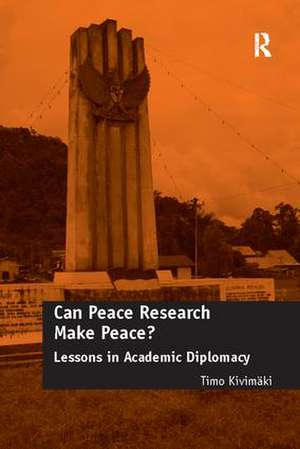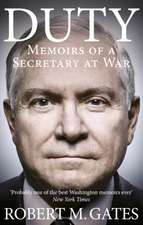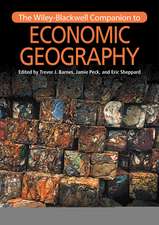Can Peace Research Make Peace?: Lessons in Academic Diplomacy
Autor Timo Kivimäkien Limba Engleză Paperback – 22 mai 2017
| Toate formatele și edițiile | Preț | Express |
|---|---|---|
| Paperback (1) | 278.13 lei 6-8 săpt. | |
| Taylor & Francis – 22 mai 2017 | 278.13 lei 6-8 săpt. | |
| Hardback (1) | 671.56 lei 6-8 săpt. | |
| Taylor & Francis – 9 noi 2012 | 671.56 lei 6-8 săpt. |
Preț: 278.13 lei
Nou
Puncte Express: 417
Preț estimativ în valută:
53.22€ • 55.71$ • 44.04£
53.22€ • 55.71$ • 44.04£
Carte tipărită la comandă
Livrare economică 05-19 aprilie
Preluare comenzi: 021 569.72.76
Specificații
ISBN-13: 9781138115521
ISBN-10: 1138115525
Pagini: 200
Dimensiuni: 156 x 234 x 11 mm
Greutate: 0.45 kg
Ediția:1
Editura: Taylor & Francis
Colecția Routledge
Locul publicării:Oxford, United Kingdom
ISBN-10: 1138115525
Pagini: 200
Dimensiuni: 156 x 234 x 11 mm
Greutate: 0.45 kg
Ediția:1
Editura: Taylor & Francis
Colecția Routledge
Locul publicării:Oxford, United Kingdom
Notă biografică
Timo Kivimäki is Professor of international relations with particular expertise in peace and conflict studies at the University of Bath. Previously he has held professorships at the University of Helsinki, University of Lapland, and at the University of Copenhagen. Professor Kivimäki has also been director of the Nordic Institute of Asian Studies (Copenhagen) and the Institute of Development Studies of the University of Helsinki. In addition to purely academic work Professor Kivimäki has been a frequent consultant to the Finnish, Danish, Dutch, Russian, Malaysian, Indonesian and Swedish governments, as well as to several UN and EU organizations on conflict and terrorism. He was President Martti Ahtisaari’s (mediators) adviser in the Aceh peace talks, and the initiator of the West Kalimantan peace process, led by Indonesia’s Vice President, Jusuf Kalla. Dr Kivimäki’s latest book, The Long Peace of East Asia was published by Ashgate in 2014.
Recenzii
Nominated for the 2014 Conflict Research Society Book of the Year Award. ’Prof. Kivimäki’s book is a fascinating analysis of the sources of and remedies to the conflict in Indonesia’s West Kalimantan. It is interesting not only for Indonesia-specialists, but also to peace researchers and peace activists. As a crucial peace practitioner in West Kalimantan, and a theorist, Prof. Kivimäki reveals the role of peace researchers as part of a team in a collaborative venture: officials and peace researchers can work together for peace. What both his practice and his analysis has pointed out is that peace research really does have an important role to play in the settlement of conflicts.’ H. Djohermansyah Djohan, Director General of Regional Autonomy, Ministry of Internal Affairs, The Republic of Indonesia
Cuprins
Chapter 1 Introduction; Chapter 2 What Kind of Junctures on the Path to Conflict Should Peace Research be Focused on?; Chapter 3 Junctures on the Path to Conflict; Chapter 4 Can the Path to Conflict be Blocked or Redirected?;
Descriere
This book is about the process and, more generally, about the opportunities that peace research and the teaching of conflict resolution can offer academic diplomacy. As such the book is both an empirical and a theoretical project. While it aims at being the most comprehensive analysis of the conflict in West Kalimantan, it also launches a new theoretical approach, neo-pragmatism, and offers lessons for the prevention of conflicts elsewhere.












